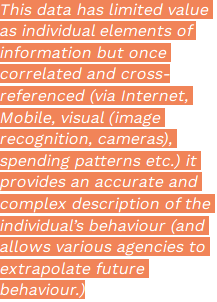Data Union: Whose Data? Our Data!
The Data Union Manifesto
(notes…in progress)
We believe that there is a need for mass organised collective action regarding data: to defend and manage personal and population-wide data. This organisation should come ‘from below’.
Why is a data union necessary now?
The creation of data is an extension of labour. As our societies move from production to service economies ‘who we are’ and ‘what we do’ becomes as significant a commodity as physical and cognitive labour. At the moment the value and control of this commodity is regulated by national law. There is little faith in the ability of governments to administer this law effectively due to a lack of technical and social understanding, inability to respond to a rapidly changing environment combined with short-term policy agendas, pressure from commercial organisations and pressure from other extra-national interests. Therefore, we have established the first International Data Union to represent the rights of individuals, outside the control of commerce or the state.
So far responses have been individual (encryption etc) we propose a collective response to these issues
What does a Data Union do? The union is founded on a Data Commons. We propose that:
- Data is owned by the creator.
- Individual’s have the right to control and leverage the value of this data.
- Individual’s can assert and define their ‘data rights’ through collective negotiation/action; a ‘Data Union’.
Protection
The Data Union protects the mass interests of the data creators. The union will protect access to data (personal freedoms, safety etc.) from commercial and state organisation and support members in leveraging the value of their data i.e. retain usage rights when used by commercial and state organisations and the depth of data referencing.
Through collective action it will maintain control and define the value of personal data to the benefit of it’s members. This collective action can take the form of passive tactics such as: data-strikes; Mass un-subscriptions, inaction and Data Pollution, to offensive actions such as direct action; mass flooding of targets property (websites, networks, email systems) and sabotage; DOS attacks and hacking.
Defining Value
The union will define value of data and leverage the value of this data for the benefit of it’s members
[sub projects]
How is data value defined?
- What is the current value of data and how is it measured?
- A ‘Stock market’
- Collective bargaining etc.
- Definition of tactics employed by the union?
What is ‘Personal Data’?
Personal Data is consensual and non-consensual information of an individuals behaviour collected and stored through:
- Surveys and subscriptions
- Legal (Tax, voting, birth/death, Benefits etc)
- Commercial organisations:
- credit card usage (loyalty cards etc)
- public transport usage (oyster cards etc)
- advertising agencies
- Surveillance:
- Commercial surveillance
- Intelligence/Police
- Travel (Border control, vegicle reg recognition)
- Local Government
- International (NSA etc)
Definition and analysis of data collection methods
Case study of data collection
Primary Data and Meta Data
Primary data: specific data; name, d.o.b., residence, nationality, mobile number, financial information, etc. Meta Data: Secondary Data that is generated from an activity e.g. browsing (stats, search terms, location etc.) Mobile (location, time, movement, network topology etc.)
Correlation:

December 24, 2013 • 13:29